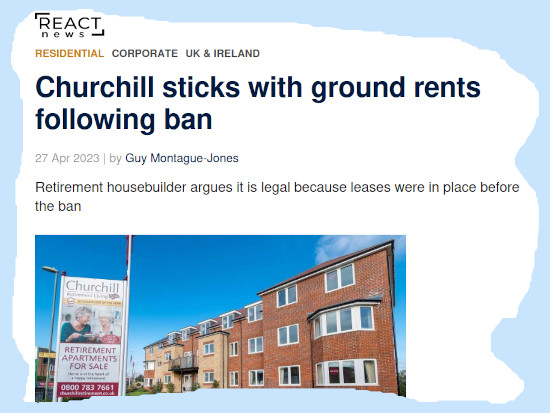
Sir Peter Bottomley is to raise with Churchill Retirement – a private company owned by the McCarthy family – its decision to continue to charge ground rents on sites that have not yet opened.
New ground rents were banned under the Leasehold Reform (Ground Rent) Act 2022, which came into force at the end of June last year – with a brief extension to April 1 2023 for retirement housebuilders, who lobbied strongly against the change.
“I would like to be reassured that no new ground rents will be introduced in retirement flats after the April 1 deadline, when they were supposed to end,” says Sir Peter, who intends to raise the issue with CEO Spencer McCarthy.
According to React News, a commercial property news website, Churchill Retirement Living “has been quoting charges of £625 a year on new flats this month, including in schemes that have yet to open”.
A Churchill spokesperson is quoted: “Developments underway where leases were already in place before April 1st will continue to have a ground rent consideration.”
LKP is aware that leasehold flats – and leasehold houses – built by non-retirement plc developers have had their legal tenure established and leases drafted long before they are built out or sold.
Indeed, during the scandal over 10-year doubling ground rents, which LKP turned into a national issue, we routinely encountered purchasers of supposedly new build leasehold flats and houses where the leases were written 6 or 7 years before sale. This meant that new leasehold buyers only had a few years before they faced the eye-watering cost of doubled ground rents – which also made the properties unsellable.
Drawing up leases before the April 1 ground rents deadline is unlikely to be a play that can be indefinitely gamed, and Churchill also states:
“In future developments where leases are not already in place we will need to increase the purchase price or introduce an alternative means of funding the communal areas which are a key feature of these sorts of developments.”
It has long been the argument of retirement housebuilders that creating ground rents compensates the developer for the communal spaces – lounge, kitchen, laundry etc – which could otherwise be a couple more flats.
LKP / Better Retirement Housing has never been sympathetic to this argument, as high ground rents attract enthusiastic commercialisers to the sector who also set about monetising the management.
Like all developers, retirement housebuilders sell their flats with slick marketing for as much as they can and routinely new retirement flats sell at a premium compared to the local property market – and often for considerably less on re-sale when they are sold without slick marketing:
We have not had case studies citing ground rents with the extraordinary sum of £625, as mentioned by React News. But retirement flat ground rents have been routinely high – £450-£550 – and way above the 0.1% purchase price value which is insisted upon by mortgage lenders. These properties, however, are bought by downsizing pensioners with cash.
Sebastian O’Kelly of Leasehold Knowledge Partnership is quoted telling React News:
“It’s an incredibly short-sighted and retrograde move from Churchill – there is much less retirement housing in the UK than in other countries like the US and Australia, and this is a good way of ensuring that remains the case.”
Meanwhile, McCarthy and Stone informs Better Retirement Housing / LKP that it has removed ground rents from all new apartments on 1 April in line with the legislation.
No one, of course, need purchase these flats, and buyers are free to tell Churchill to redraft the lease and remove the ground rents, or go elsewhere.
Churchill Retirement also appears to be upset with government over an anti-business agenda.

In February Churchill CEO Spencer McCarthy told Housing Today that he disapproved of the post-Grenfell £3 billion building safety levy imposed on developers: “It’s like blackmail. The government is saying ‘if you don’t sign up, we’ll stop you trading’. It’s astonishing, from a Conservative government you’d think would support growth.”
Mr McCarthy was further indignant over Housing Secretary Michael Gove admission that building regulations were faulty prior to Grenfell: “Companies were just following guidance, these were homes built according to the regs at the time.”
He was “astonished” at the policies being brought forward by a Conservative government, which he would normally expect to support growth.
Another gripe concerns planning issues, particularly in Conservative councils.
Curiously, Better Retirement Housing / LKP has always been sympathetic on this point, deprecating councils prejudice against retirement housebuilding and retirement communities. Retirement housebuilders are further disadvantaged compared with the non-retirement sector as they cannot easily sell off-plan as customers need a home for an elderly relative with immediate availability.
Churchill Retirement, which turns over £200 million a year, built 513 units last year.





 Don’t extend your lease if that puts you on the hook for building safety bills (this applies to non-highrises, too)
Don’t extend your lease if that puts you on the hook for building safety bills (this applies to non-highrises, too)






















If a lease is granted for a premium then the ground rent must be a peppercorn as it is a regulated lease
A lease granted at a nil premium would appear to able to be granted with a ground rent as it would not be regarded as a regulated lease under the 2022 Act
Therefore a holding company could grant a lease for a nil premium with a ground rent to us subsidiary and then the subsidiary company sell the lease to a consumer for a price which reflected the burden the ground rent has on the value of the property
This apparent loophole in the law was made to avoid a normal AST being treated as void – as the granting of an AST is for no premium and of course with a rent
If a lease is granted for a nil premium with a rent then it would be difficult for the tenant/lessee to argue later on that the rent is unfair – but given half a chance some would
Why go to such lengths? Of course we all know the answer. Making a profit is fine but being able to treat leaseholders as cash cows in perpetuity is far more lucrative – so there is every incentive for developers to find a back door around the legislation (for those without a moral compass at least).
People should just vote with their feet and refuse to buy, but when there is a shortage of housing there may not be much option. And don’t tell me it’s still a choice so that’s ok. It’s an imbalance of power and it’s not ok to exploit people in this way.
The market is still broken and the only way to fix it is to regulate – properly and robustly.
Churchill Retirement Living are prime example why panel conveyancing solicitors that get paid by the developer should never be allowed,
Solicitors should not be allowed to act under such conflict of interest.
The whole way retirement apartments are being sold and run needs to be far more transparent.
spot on, so true and that is exactly a big part of the current problem.
they are all in it together
A dreadful company under whatever name they go by. Unfortunately with current weak or no regulation they can advertise their glossy properties as they see fit – with no statuary warning alongside. Think selling cigarettes with warnings how they can affect one’s health, well how about a financial warning?
Also with regard to morally corrupt charging ground rents what does their comment mean:
“In future developments where leases are not already in place we will need to increase the purchase price or introduce an alternative means of funding the communal areas which are a key feature of these sorts of developments.”
Surely ground rent has nothing to do with funding communal areas, that’s what a service charge is for!?
The obligation to pay a ground rent will detract from the sale price – it is integral part of the consideration
If two identical flats are offered for sale one with a ground rent of £500 a year and the other at a peppercorn then purchasers will be more attracted to the later and therefore should pay more
The root of the problem with ground rent is that the financial burden it placed on the property was never quantified and shown next to the purchase price so buyers could make an informed choice. A ground rent if £500 per annum linked to the RPI should impact on the value of the flat by around £13k to £15k
Looking at these comments, I can see why people do not like the idea of panel solicitors for developers. However ,there are commercial reasons why they exist.
It is very difficult for a solicitor to make a profit on most one-off new build instructions. as they cannot charge enough for the time involved.
New build developments tend to have a large amount of planning approvals, planning agreements, deeds, estate management companies,, service charge information, building warranties, leases etc on top of the standard documents. To go through all that documentation thoroughly and to extract relevant information for a buyer can take several days , which is not commercially viable and can tempt some to cut corners and hope for the best.
Many solicitors will turn away purchasers of new builds as the complexity and time involved are not worth the fees.
The way for solicitors to make new builds cost effective is to act for several buyers on the same development, so they do not have to keep going over the title information again and again. This is why panel conveyancers exist.
Extracting such details sounds like a job for ai, like chat . Wouldn’t like to be a panel solicitor.